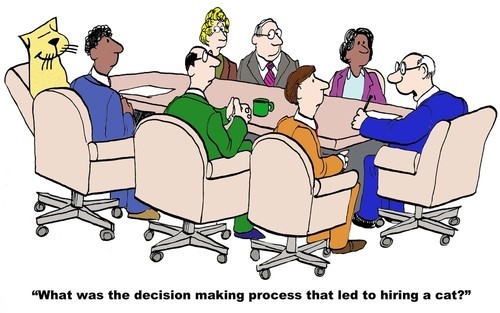We encourage professional facilitators to carry a toolbox. Include some intervention devices when you need to shake up your participants. Be prepared to challenge groupthink if you start hearing things like . . .
-
That will never change.
-
We don’t do things like that around here.
-
etc.
. . . then you may want to jolt your participants. We have covered similar exercises in other Best Practices articles such as “Four Dots” and “Bookworm”. Here is another example that is quick, simple, and effective. Some call it the “Spot.”
Groupthink: Your Goal
To shake up a paradigm, challenge groupthink. Otherwise, get your participants to focus on the CONTEXT of something in addition to the CONTENT.
Groupthink: One Halting Method
Using a large flip chart, or distributing white sheets of paper, place a small, colored spot or a few colored spots on the paper. Ask the participants to indicate what they see on the paper.
Most of them, and usually in sequence, will indicate they see a “Green Spot” (or any color you choose). Consider using the white space on the easel to tally the number of same or similar responses.
While confirming that you also see the spot(s), NOTE that most individuals overlooked a large amount of white space surrounding the dots. Participants frequently miss or under-appreciate the context around us or the deliverable (be it a decision, a plan, etc.). You may point to the importance of interpersonal relationships at work as an example.
Additionally, you may point out that customers tend to identify the blemishes in our products and services, and frequently have a reasonable expectation for them to be fixed. Likewise, management focuses on the “dots” of our projects or personal performance, failing to properly value the vastness of good, solid contributions and effort.
Conclude by sharing that while it may be appropriate to look for the “spots”, we should also force ourselves to consider the large white area of equal importance. If there is any unique contribution or answer besides “dots” emphasize how that voice may have been discounted when the rest of the group focused on the “dots”, when in fact that solo voice may have been speaking about something far more important than the rest of the group combined.
______
Don’t ruin your career by hosting bad meetings. Sign up for a workshop or send this to someone who should. MGRUSH workshops focus on meeting design and practice. Each person practices tools, methods, and activities every day during the week. Therefore, while some call this immersion, we call it the road to building high-value facilitation skills.
Our workshops also provide a superb way to earn up to 40 SEUs from the Scrum Alliance, 40 CDUs from IIBA, 40 Continuous Learning Points (CLPs) based on Federal Acquisition Certification Continuous Professional Learning Requirements using Training and Education activities, 40 Professional Development Units (PDUs) from SAVE International, as well as 4.0 CEUs for other professions. (See workshop and Reference Manual descriptions for details.)
Want a free 10-minute break timer? Sign up for our once-monthly newsletter HERE and receive a timer along with four other of our favorite facilitation tools, free.

Terrence Metz, president of MG RUSH Facilitation Training, was just 22-years-old and working as a Sales Engineer at Honeywell when he recognized a widespread problem—most meetings were ineffective and poorly led, wasting both time and company resources. However, he also observed meetings that worked. What set them apart? A well-prepared leader who structured the session to ensure participants contributed meaningfully and achieved clear outcomes.
Throughout his career, Metz, who earned an MBA from Kellogg (Northwestern University) experienced and also trained in various facilitation techniques. In 2004, he purchased MG RUSH where he shifted his focus toward improving established meeting designs and building a curriculum that would teach others how to lead, facilitate, and structure meetings that drive results. His expertise in training world-class facilitators led to the 2020 publication of Meetings That Get Results: A Guide to Building Better Meetings, a comprehensive resource on effectively building consensus.
Grounded in the principle that “nobody is smarter than everybody,” the book details the why, what, and how of building consensus when making decisions, planning, and solving problems. Along with a Participant’s Guide and supplemental workshops, it supports learning from foundational awareness to professional certification.
Metz’s first book, Change or Die: A Business Process Improvement Manual, tackled the challenges of process optimization. His upcoming book, Catalyst: Facilitating Innovation, focuses on meetings and workshops that don’t simply end when time runs out but conclude with actionable next steps and clear assignments—ensuring progress beyond discussions and ideas.





Terrence – great suggestion, thank you!
Thanks Jason for taking the time to reply, You should find some other worthwhile goodies at http://mgrush.com/shop/